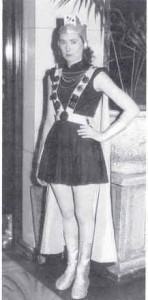Norma is Judging You
 Something of great interest to the Galactic Suburbia crew this year was the launch of what is officially known as the Norma K Hemming award, but which we in our podcastly wisdom prefer to affectionately refer to the NAWWWMA (imagine the occerest accent imaginable) because it makes an award feel more iconic to have a one word name. Like the Hugos, or the Ditmars, or Cher.
Something of great interest to the Galactic Suburbia crew this year was the launch of what is officially known as the Norma K Hemming award, but which we in our podcastly wisdom prefer to affectionately refer to the NAWWWMA (imagine the occerest accent imaginable) because it makes an award feel more iconic to have a one word name. Like the Hugos, or the Ditmars, or Cher.
Whoa, what would you give a Cher Award for? Big hair?
Also, if you called it a 'Hemming' for short it might be a touch more dignified, but also renders invisible the fact that it's named after a woman, something still very rare in our field. 'Norma' is hard to miss.
The Norma is designed to mark excellence in the exploration of themes of race, gender, sexuality, class and disability, in speculative fiction works by Australians, or in Australia – the last one being a new addition for the second year of the award. As a longtime Tiptree fangirl, I am excited for us to have our own award to celebrate themes of diversity. I know that it seems at times as if there are so many awards that it's hardly worth having any more, but something like the Norma has different criteria to something which is more generically looking for the "best" of a given category, and may work to expand people's definitions of what good speculative fiction actually is.
"Win a Norma" certainly got added to my longlist of career wishes, along with "get nominated for a Tiptree," "win a Tiptree" and "get to judge the Tiptree." Like any award, though, it doesn't matter what pretty rhetoric goes with it, its true significance can't be seen until you're a decade in and can look back and see just how interesting a list of winners it is. I look forward to that.
 Norma Hemming herself was a fan and writer in the Australian scene. I love this iconic picture of her – more than any other details about her life, this makes me feel like she's a person I know. After all, you can't function in fandom without having a killer bitchface scowl, right? Not sure what she's thinking when the camera snapped, but I like to think it's something along the lines of "I am so judging you right now." Or possibly "Where's my jetpack?"
Norma Hemming herself was a fan and writer in the Australian scene. I love this iconic picture of her – more than any other details about her life, this makes me feel like she's a person I know. After all, you can't function in fandom without having a killer bitchface scowl, right? Not sure what she's thinking when the camera snapped, but I like to think it's something along the lines of "I am so judging you right now." Or possibly "Where's my jetpack?"
The 2010 Norma was given posthumously to Maria Quinn for The Gene Thieves (HarperCollins). Entries are now open for the 2011 award (works published in 2010). Anyone can submit works, though the need to supply 4 copies to the judges is probably going to limit nominators to authors and publishers. I always think it's a bit of a shame to be so rigid about such matters – while you don't want judges to feel obliged to purchase a lot of material themselves as used to happen in the olden days of Aurealis judging, at the same time I think it's good if suggestions are encouraged from a wider range of people, and there's something to be said for hunting and gathering as being an essential part of a judge's duties…
So what novels or stories would you recommend to be Norma-worthy? I know that my first thoughts go to two stories by Thoraiya Dyer published by Twelfth Planet Press this year – "Yowie" from Sprawl and "Edward Teach" from the new TPP Double. "Teach" in particular has a lot to say about race and culture, and how alienating it can be for a Jewish or Muslim teen growing up in Australia – and that's before the story gets to all the crunchy genderswapping. I also think that Glitter Rose, particularly the original story "Mama Ailon" would be worth considering, for what it has to say about pregnancy and motherhood. I had to think about this one – certainly in general fiction, dealing with such themes is hardly an exceptional exploration of gender roles, but because female biology is so often ignored or disregarded in fantasy and science fiction, I think it counts. I'd also point out that Angela Slatter's Sourdough and Other Stories does a great deal to explore gender roles in fairy tales, and particularly to look at the portrayal of female characters in those stories. In novels, Karen Healey's Guardian of the Dead has lots of crunchy themes of diversity, including a very rare and sympathetic portrayal of an asexual character – the first time I've seen this in a YA novel!
I'm sure I've missed lots. What else is there?



